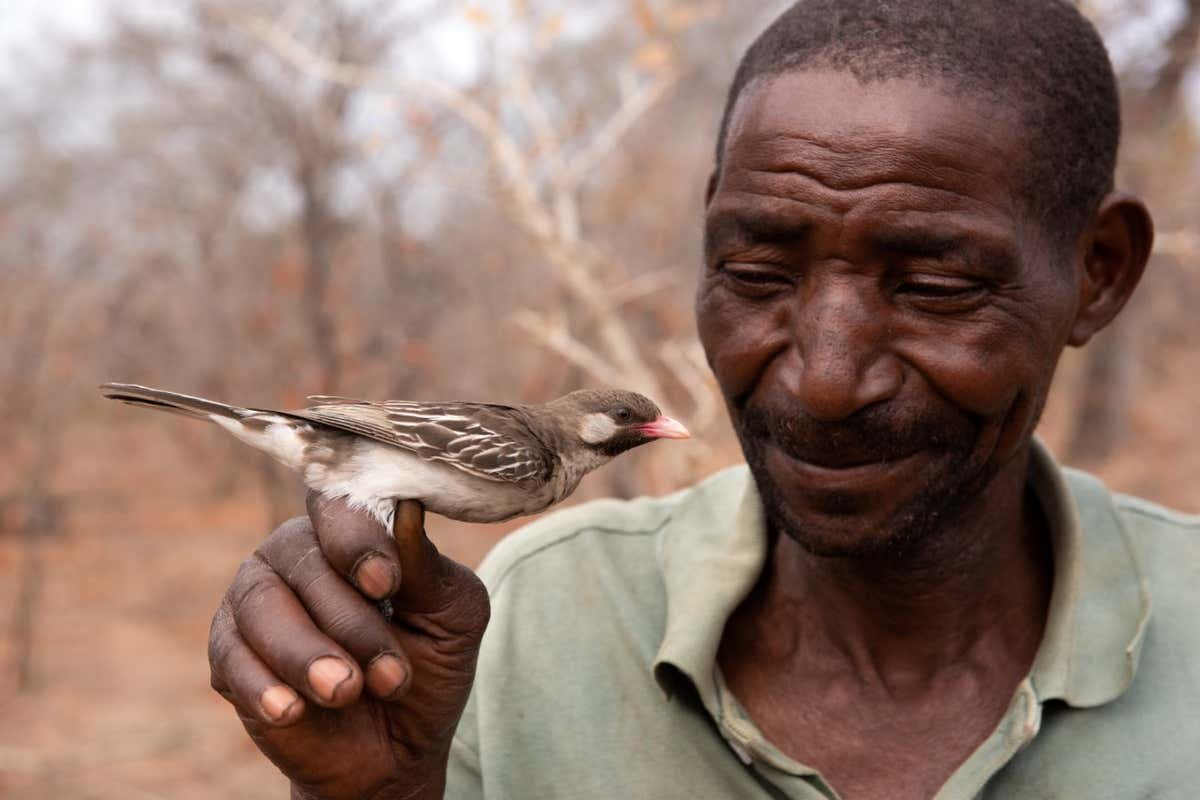
A Yao honey-hunter in Mozambique holds a honeyguide bird
Claire Spottiswoode
People from multiple cultures in Africa have unique sounds that they use to communicate with honeyguide birds, and the birds recognise these signals as an invitation to cooperate.
Greater honeyguides (Indicator indicator) lead humans to bees’ nests so that honey-hunters will break them open. While the humans collect the honey, the birds feast on beeswax and larvae.
To learn more about how the two species communicate in this remarkable partnership, Claire Spottiswoode at the University of Cape Town, South Africa, and Brian Wood at the University of California, Los Angeles, accompanied experienced honey-hunters from the Hadza people in Tanzania and the Yao people in Mozambique. In both locations, they played recordings of the bird-like whistles that Hadza-honey hunters use to summon the birds and the “trill-grunt” sounds used by Yao honey-hunters.

Yao honey-hunters in Niassa Special Reserve, Mozambique
Claire Spottiswoode
In Tanzania, honeyguides responded in 81 per cent of tests involving the local Hadza sounds, but just 24 per cent of those where foreign Yao calls were played.
In Mozambique, honeyguides responded in nearly 75 per cent of tests using familiar Yao sounds, compared with just 25 per cent for the Hadza whistles.
This shows that birds in different regions have learned to recognise the specific signals used by honey-hunters in their local area, which are passed down from generation to generation within each culture.
“Where there is a human cultural tradition that’s become established, it pays honeyguides to learn it, and honeyguides learning it in turn further reinforces the cultural tradition,” says Spottiswoode.
The partnership is a rare case of humans and wild animals cooperating for mutual benefit. At the heart of this collaboration is the two species’ capacity to communicate.
“Our ability to assign meaning to arbitrary sounds enables us to communicate and cooperate as humans,” says Spottiswoode. “Perhaps it shouldn’t surprise us that we see something analogous when we actively cooperate with individuals of another species.”
Topics:

Felecia Phillips Ollie DD (h.c.) is the inspiring leader and founder of The Equality Network LLC (TEN). With a background in coaching, travel, and a career in news, Felecia brings a unique perspective to promoting diversity and inclusion. Holding a Bachelor’s Degree in English/Communications, she is passionate about creating a more inclusive future. From graduating from Mississippi Valley State University to leading initiatives like the Washington State Department of Ecology’s Equal Employment Opportunity Program, Felecia is dedicated to making a positive impact. Join her journey on our blog as she shares insights and leads the charge for equity through The Equality Network.




